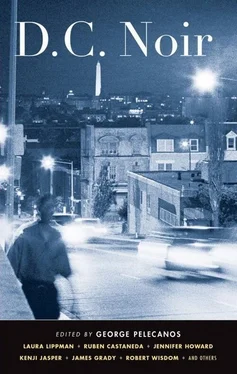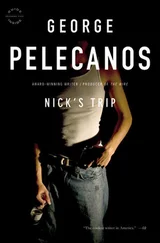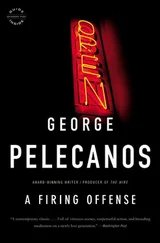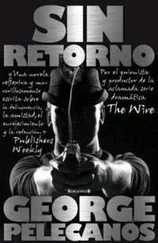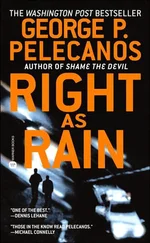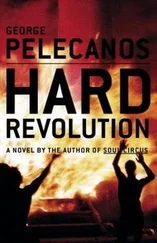“Is everything all right over there, Mr. Wisdom?”
“Every ting is juss fine.”
My father said good morning to someone else on the street. He must have been sitting out there on the porch all through the night. I just sat looking out, hearing the quiet, thinking how I wanted to go on up to Rock Creek Park and get lost in the woods. I glanced over and my mom was standing there silently. She eased my little sister’s head off the pillow and sat her up. Then went into the kitchen to fix breakfast. I could hear her crying.
By 9 o’clock we were in the morning service. My mother, who taught Sunday school, always brought us early. My father only came to church for weddings, baptisms, and funerals. We were sitting in the middle section and the wooden chairs threatened to tip over with the big bodies. The junior choir had everybody on their feet and a fan cooled the sweating bodies. I was in my iridescent blue suit, white shirt, and tie. I just looked around at everyone and the smooth wooden floors and the feet walking by, carrying this one big woman after she got the spirit. The choir master was leaning back, mouth open, and the people were singing and clapping, but I couldn’t hear a sound. I ran the toe of my shoe through a smooth groove in the floor-board. Blam! Blam! the only sound in my head. Everything else around me was a blizzard of empty details. Details that would be packed away inside me without being looked at, without letting them touch me. Blam! My hands were sweating into my little sister’s — the only touch I let myself feel.
Fast forward: My stories don’t really come all crafted into a nice tale. There are a whole bunch of things that come up as I tell this, and these are part of the story now. These little memories like bees in my mind’s eye, threatening, buzzing around my head. Dangling threads that invariably lead to something deeper and darker… the innocence of learning to slow-drag with a girl on the dance floor and how the next day she was attacked and raped by a much older man. But nobody ever really talked about it. My friend was way different after that and nobody ever danced with her again. These are now just memories from the comfort zone of my current life, away from police sirens, getting jumped after school, and having to fight regularly just to get home. Long bus rides across D.C. to Spring Valley, to a world where there were no gangs, knives, anger, violence, roaches, and threats — at least, not in the streets where you had to look at it all the time.
You see, the cats I grew up with didn’t hold on to our stories, we kept pure emotion hidden, cause we were the kids of the city. You had to be a quick study to survive. If you showed any feelings, much less reflection, you got your ass kicked over and over. Those kids who moved up from North Carolina and came into our neighborhood with their accents and their openness were laughed at till they conformed. If your parents cared, they fought to create some conditions so that you could value your life, your experiences — but on the street your story didn’t have any value. Top dog/dirty dog. Only material things were valued on the street… One day I’ma get me a [insert Cadillac, $50 shoes, etc].
When I started going to an exclusive private school, I became convinced my stories didn’t have value. So it was better to appropriate their stories — be like them, at least on the outside — because what could my stories contribute to the lives of these princes.
In college, there was an unspoken message to let go of the past, of my story, to move forward. When I came home for holidays and caught up with Green Jeans, Brock, or Black Joe, they told me stories, all the stories of who got locked up, broke down, shot, or OD’d. These stories were snuffed out and then forgotten, never to be recounted. College brought me pan-Africanism, the Nation of Islam, and other progressive movements meant to shape the black identity, to give us “real” stories. As these movements required new names, clothes, identity, I started feeling a strong pull back toward my own stories, though I still didn’t have the will to tell them.
An anchor dropped in high school kept me connected with the life stories I owned. My track coach, Brooks Johnson, drilled into me the importance of character and pride . His mantra took root in my life and became magnified through the men and women around me: my father and mother, my father’s best friend Mr. Christian, other coaches, and my Episcopalian headmaster Canon Martin. These were fiery and gentle people whose lives seemed guided by their stories. The light and the dark.
I had to find ways to avoid being consumed by the myriad of dark impulses that came into my life. I had to figure how o live before I could recount, before I could truly own my story. It is very long and it continues. The stories I began but couldn’t finish can now be looked at and coaxed back… I can take the gloves off, stop fighting life and instead hold it.
I left my neighborhood in the 1970s. Even though the razor-sharp edge of living in Petworth has dulled, I now hoard the memories. I find myself looking back, repeatedly — at street corners, empty stretches of Kansas Avenue, Sherman Circle — and these quiet scenes are arranged in my mind into strange, chaotic stacks, as if waiting for the day they will reveal themselves as the hidden alphabet that somehow spells out my life’s meaning.
The potency is in the stacking. Laying them down in a brushed-steel coffin was too cold, I needed to heat them up with my experiences since that time and bring the life back to them. They needed to be honored. The characters and events struggled for a place in my soul. This is the richness I’m now willing to talk about.
A.R.M. And the woman
by Laura Lippman
Chevy Chase, N.W.
Sally Holt was seldom the prettiest woman in the room, but for three decades now she had consistently been one of the most sought-after for one simple fact: She was a wonderful listener. Whether it was her eight-year-old son or her eighty-year-old neighbor or some male in-between, Sally rested her chin in her palm and leaned forward, expression rapt, soft laugh at the ready — but not o ready, which gave the speaker a feeling of power when the shy, sweet sound finally bubbled forth, almost in spite of itself. In the Northwest quadrant of Washington, where overtly decorative women were seen as suspect if not out-and-out tacky, a charm like Sally’s was much prized. It had served her well, too, helping her glide into the perfect marriage to her college sweetheart, a dermatologist, then allowing her to become one of Northwest Washington’s best hostesses, albeit in the amateur division. Sally and her husband, Peter, did not move in and did not aspire to the more rarefied social whirl, the one dominated by embassy parties and pink-faced journalists who competed to shout pithy things over one another on cable television shows. They lived in a quieter, in some ways more exclusive world, a charming, old-fashioned neighborhood comprising middle-class houses that now required upper-class incomes to own and maintain.
And if, on occasion, in a dark corner at one of the endless parties Sally and Peter hosted and attended, her unwavering attention was mistaken for affection, she managed to deflect the ensuing pass with a graceful shake of her auburn curls. “You wouldn’t want me,” she told the briefly smitten men. “I’m just another soccer mom.” The husbands backed away, sheepish and relieved, confiding in each other what a lucky son of a bitch Peter Holt was. Sally Holt had kept her figure, hadn’t allowed herself to thicken into that androgynous khaki-trousered — let’s be honest, downright dykish — mom so common in the area, which did have a lot of former field hockey players gone to seed. Plus, she was so great to talk to, interested in the world, not forever prattling about her children and their school.
Читать дальше
